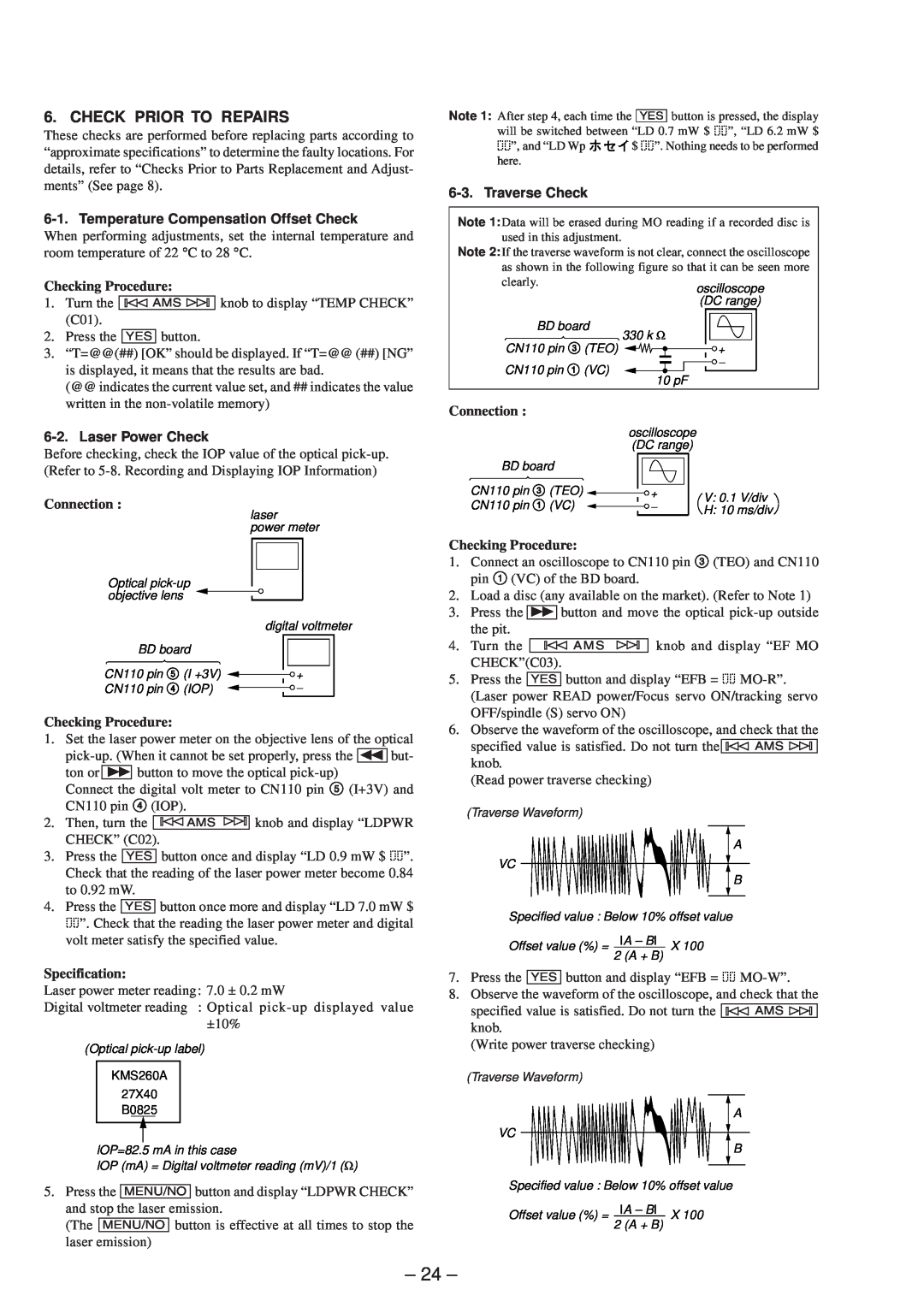
6. CHECK PRIOR TO REPAIRS
These checks are performed before replacing parts according to “approximate specifications” to determine the faulty locations. For details, refer to “Checks Prior to Parts Replacement and Adjust- ments” (See page 8).
6-1. Temperature Compensation Offset Check
When performing adjustments, set the internal temperature and room temperature of 22 °C to 28 °C.
Checking Procedure:
1.Turn the [ÊÊÊÊÊÊÊÊAMSÊÊÊÊÊÊÊÊ]- ± knob to display “TEMP CHECK” (C01).
2.Press the [YES] button.
3.“T=@@(##) [OK” should be displayed. If “T=@@ (##) [NG” is displayed, it means that the results are bad.
(@@ indicates the current value set, and ## indicates the value written in the
6-2. Laser Power Check
Before checking, check the IOP value of the optical
Connection :
laser
power meter
Optical ![]()
digital voltmeter
BD board |
|
|
| |
|
|
| ||
CN110 pin 5 | (I +3V) |
|
|
|
+ |
| |||
CN110 pin 4 | (IOP) |
| – | |
Checking Procedure:
1.Set the laser power meter on the objective lens of the optical
Connect the digital volt meter to CN110 pin 5 (I+3V) and CN110 pin 4 (IOP).
2.Then, turn the [ÊÊÊÊÊÊÊÊAMSÊÊÊÊÊÊÊÊ]- ± knob and display “LDPWR CHECK” (C02).
3.Press the [YES] button once and display “LD 0.9 mW $ ![]()
![]() ”. Check that the reading of the laser power meter become 0.84 to 0.92 mW.
”. Check that the reading of the laser power meter become 0.84 to 0.92 mW.
4.Press the [YES] button once more and display “LD 7.0 mW $
![]()
![]() ”. Check that the reading the laser power meter and digital volt meter satisfy the specified value.
”. Check that the reading the laser power meter and digital volt meter satisfy the specified value.
Specification:
Laser power meter reading : 7.0 ± 0.2 mW
Digital voltmeter reading : Optical
(Optical
KMS260A
27X40 B0825
lOP=82.5 mA in this case
lOP (mA) = Digital voltmeter reading (mV)/1 (Ω)
5.Press the [MENU/NO] button and display “LDPWR CHECK” and stop the laser emission.
(The [MENU/NO] button is effective at all times to stop the laser emission)
Note 1: After step 4, each time the [YES] button is pressed, the display
will be switched between “LD 0.7 mW $ | ”, “LD 6.2 mW $ | ||
”, and “LD Wp | $ | ”. Nothing needs to be performed | |
here. |
|
|
|
6-3. Traverse Check
Note 1: Data will be erased during MO reading if a recorded disc is used in this adjustment.
Note 2: If the traverse waveform is not clear, connect the oscilloscope as shown in the following figure so that it can be seen more clearly.
BD board
![]() 330 k Ω
330 k Ω
CN110 pin 3 (TEO)
CN110 pin 1 (VC) ![]()
![]() 10 pF
10 pF
Connection :
oscilloscope (DC range)
BD board
CN110 pin 3 | (TEO) | + | V: 0.1 V/div | ||
CN110 pin 1 | (VC) | ||||
| – | H: 10 ms/div | |||
Checking Procedure:
1.Connect an oscilloscope to CN110 pin 3 (TEO) and CN110 pin 1 (VC) of the BD board.
2.Load a disc (any available on the market). (Refer to Note 1)
3.Press the [ÊÊÊÊÊÊ]) button and move the optical
4.Turn the [ÊÊÊÊÊÊÊÊAMSÊÊÊÊÊÊÊÊ]- ± knob and display “EF MO CHECK”(C03).
5.Press the [YES] button and display “EFB = ![]()
![]()
6.Observe the waveform of the oscilloscope, and check that the specified value is satisfied. Do not turn the[ÊÊÊÊÊÊÊÊAMSÊÊÊÊÊÊÊÊ]- ± knob.
(Read power traverse checking)
(Traverse Waveform)
A
VC
B
Specified value : Below 10% offset value
Offset value (%) = IA – BI X 100 2 (A + B)
7.Press the [YES] button and display “EFB = ![]()
![]()
8.Observe the waveform of the oscilloscope, and check that the specified value is satisfied. Do not turn the [ÊÊÊÊÊÊÊÊAMSÊÊÊÊÊÊÊÊ]- ± knob.
(Write power traverse checking)
(Traverse Waveform)
A
VC
B
Specified value : Below 10% offset value
Offset value (%) = IA – BI X 100 2 (A + B)
